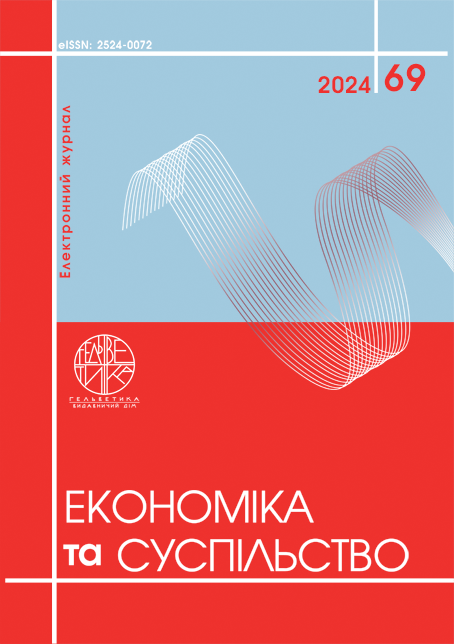THE IMPACT OF THE AFRICAN CONTINENTAL FREE TRADE AREA ON ECONOMIC INTEGRATION AND DEVELOPMENT IN AFRICA
Abstract
The study examines the impact of the African Continental Free Trade Area (AfCFTA) on economic integration, social development, and economic progress in African countries. The research highlights the significance of AfCFTA in fostering intra-African trade, attracting foreign investments, and reducing dependence on external markets. The study also explores how AfCFTA contributes to the establishment of a unified market, the expansion of production capacities, and the enhancement of the competitiveness of African enterprises. Particular attention is given to the initiative's effects on employment, access to basic services, and the reduction of inequality among the population. The research employs a comprehensive methodological approach, including quantitative analysis of economic indicators and qualitative evaluation of policy impacts. The methods used allowed for a detailed examination of trade flows, social metrics, and institutional dynamics, revealing both progress and persistent challenges in implementing AfCFTA. Key challenges identified include uneven economic development, inadequate infrastructure, residual trade barriers, and institutional constraints that hinder the realization of AfCFTA's full potential. The results underscore the necessity of addressing these challenges through policy harmonization, strengthening institutional frameworks, and integrating social considerations into development strategies. These findings provide insights into how AfCFTA can further drive sustainable development, foster deeper integration of African markets, and enhance the region's role in the global economy. The practical value of this study lies in offering actionable recommendations for policymakers, businesses, and development organizations seeking to maximize the benefits of AfCFTA and overcome obstacles to its effective implementation. By focusing on a balanced approach that combines economic, social, and institutional perspectives, the study emphasizes the transformative potential of AfCFTA for achieving long-term growth and prosperity across the continent. The findings are particularly relevant for formulating strategic initiatives aimed at enhancing regional cooperation and ensuring equitable economic opportunities for all member states.
References
Ксендзук В.В., Власюк Т.О., Поліщук О.С. Неоколонізація Африки: безпеково-військовий та економічно-інвестиційний аспекти інструментів впливу іноземних держав. 2023.
African Union. Agenda 2063: The Africa We Want. URL: https://au.int/en/agenda2063/overview (дата звернення: 09.12.2024).
Bazaluk O., Yatsenko O., Reznikova N., Bibla I., Karasova N., Nitsenko V. International Integration Processes Influence on Welfare of Country. Journal of Business Economics and Management. 2022. Vol. 23. № 2. P. 382–398. DOI: https://doi.org/10.3846/jbem.2022.16228.
Meifa F. The effects of decolonization in Africa. 2014. URL: https://api.semanticscholar.org/CorpusID:58912583 (дата звернення: 09.12.2024).
Observatory of Economic Complexity. URL: https://oec.world/en (дата звернення: 09.12.2024).
Wapmuk S., Muhammed J. The African Continental Free Trade Area (AfCFTA) And Regional Economic Integration: Prospects And Challenges. Zamfara Journal of Politics and Development. 2022. Vol. 3. № 1.
African Continental Free Trade Area (AfCFTA). URL: https://au-afcfta.org/ (дата звернення: 09.12.2024).
United National Development Programme. Human Development Index. URL: https://hdr.undp.org/data-center/human-development-index#/indicies/HDI (дата звернення: 09.12.2024).
World Bank Group. World Bank Open Data. URL: https://data.worldbank.org/ (дата звернення: 09.12.2024).
Ksenzuk, V. V., Vlasiuk, T. O., Polishchuk, O. S. Neokolonizatsiia Afryky: bezpekovo-viiskovyi ta ekonomichno-investytsiinyi aspekty instrumentiv vplyvu inozemnykh derzhav [Neocolonization of Africa: Security-Military and Economic-Investment Aspects of Foreign States' Influence Tools]. 2023.
African Union. Agenda 2063: The Africa We Want. URL: https://au.int/en/agenda2063/overview (accessed: 09.12.2024).
Bazaluk, O., Yatsenko, O., Reznikova, N., Bibla, I., Karasova, N., Nitsenko, V. International Integration Processes Influence on Welfare of Country. Journal of Business Economics and Management. 2022. Vol. 23. № 2. P. 382–398. DOI: https://doi.org/10.3846/jbem.2022.16228.
Meifa, F. The effects of decolonization in Africa. 2014. URL: https://api.semanticscholar.org/CorpusID:58912583 (accessed: 09.12.2024).
Observatory of Economic Complexity. URL: https://oec.world/en (accessed: 09.12.2024).
Wapmuk, S., Muhammed, J. The African Continental Free Trade Area (AfCFTA) And Regional Economic Integration: Prospects And Challenges. Zamfara Journal of Politics and Development. 2022. Vol. 3. № 1.
African Continental Free Trade Area (AfCFTA). URL: https://au-afcfta.org/ (accessed: 09.12.2024).
United National Development Programme. Human Development Index. URL: https://hdr.undp.org/data-center/human-development-index#/indicies/HDI (accessed: 09.12.2024).
World Bank Group. World Bank Open Data. URL: https://data.worldbank.org/ (accessed: 09.12.2024).

This work is licensed under a Creative Commons Attribution 4.0 International License.


